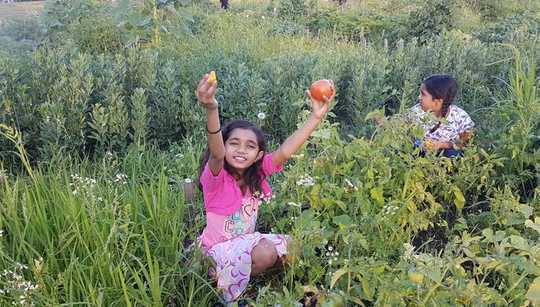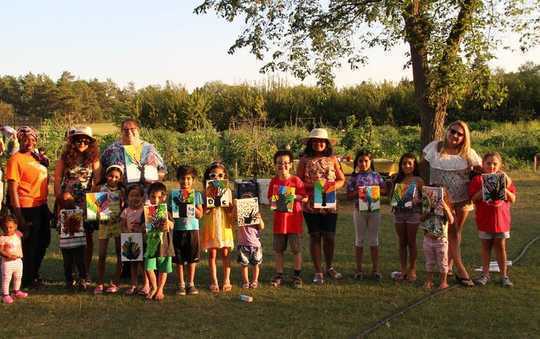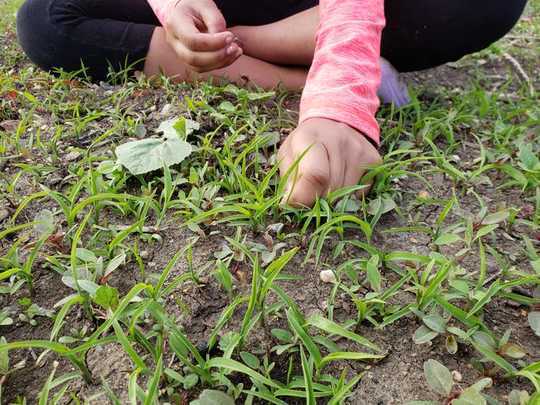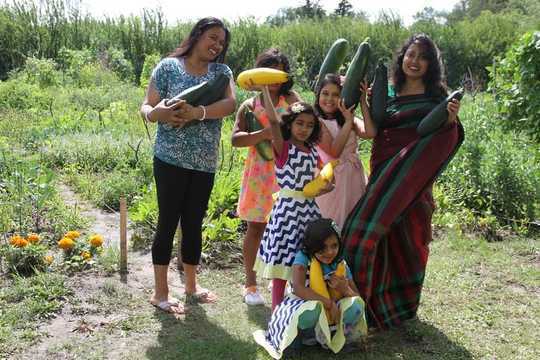
Cross-cultural community gardens that include learning activities can increase food security and also help with reconciliation. Author provided
About eight years ago, 10 families (including mine) and others started a small community garden in Saskatoon. We had 10 garden plots and gardeners from three different countries. We invited nearby residents to participate. Many of them lived in the University of Saskatchewan campus-owned apartments.
Given that the poverty around us includes a lack of affordable nutritious food and is compounded by community isolation and culture shock, we wanted to build a cross-cultural, environmentally sustainable garden community. With our desire to engage with food sovereignty and reconciliation, we hoped to engage Indigenous Peoples, racialized minorities and non-visible minorities to talk about reconciliation and decolonization.
The Food and Agriculture (FAO) Organization of the United Nations calls food sovereignty “a basic human right.” It is the right to access healthy food and to control food policy.
We wanted to create a shared space where children and adults could grow their own food and also learn how to create food security in our community. We planned to share what we learned with larger communities.
Get The Latest By Email

This picture shows art activities at the Saskatoon Community Garden. Author provided
By starting small and working steadily, we were able to grow our garden and, along with that, our knowledge and our cross-cultural community. Many children were there daily, especially during weekends and in the summer, when schools were closed.
We used a participatory action style of research which involves the community, and published the results in the Local Environment journal. Based on our study, I believe cross-cultural land-based activities can make positive changes in an urban environment.
Land-based learning was an important part of our garden activities. Land-based learning is a process of learning how to build relationships with land, Indigenous people, insects, plants and animals. The insights from the garden collective also provide valuable information for educators, especially those who are interested in incorporating land-based learning as well as those who hope to create a sense of belonging in cross-cultural communities. Ultimately belonging and land-based learning leads to community empowerment.
Indeed, providing the space and educational resources for our community to grow food has had incredible impacts. By 2018, our garden space had grown to 120 garden plots with more than 25 countries and cultures represented.
Membership has bloomed to 400 adults and 60 children. Another six sharing plots were created. Two plots were for sharing food with local people, two for students and two for neighbours without access to garden space.
We have learned that environmental sustainability through cross-cultural activities can develop our knowledge about interspecies communication, land-based learning, community belonging and learning about decolonization and reconciliation.
Food insecurity
Our community garden plays a significant role in food security and food sovereignty.
The Canadian mainstream narrative about sustainability ignores Indigenous knowledge and takes for granted ideas coming from diverse cultural groups and marginalized communities. Community gardening and land-based learning is one approach that can help us rethink the narrow narrative about the concept of sustainability.
Indigenous people, international students, immigrants and refugee families are particularly vulnerable populations that experience a lack of sustainability for various reasons, including lack of belonging and networks, low income, mental stress and discrimination.

One gardener said: ‘We could not afford to buy fresh vegetables from the superstore. I was sad for our children that they are not getting enough nutrients due to poverty.’
Food insecurity within immigrant and refugee communities in North America is a significant challenge. New immigrants and refugee communities experience higher rates of food insecurity than any other community in North America.
Our summer garden activities and engagements with the food production system helped to ensure food sovereignty.
One gardener said: “I spent $10 to buy seeds from the superstore. In the long run our small size of plot produced more than $200 fresh vegetables.”
Another gardener commented:
“We could not afford to buy fresh vegetables from the superstore. I was sad for our children that they are not getting enough nutrients due to poverty. However, the community garden gave us the access to organic, fresh vegetables. We could preserve our home-grown vegetables for six months.”
As a community, we found a way to think about and work towards localizing food systems, valuing food producers, engaging with nature, transferring the food-producing knowledge to the next generation and making decisions locally.
Reconciliation and cross-cultural understanding
Through the cross-cultural activities in our community garden, we attempted to uncover the complex entanglements among refugees, immigrants and non-immigrants (Indigenous and non-Indigenous) communities. Our community garden offers tangible strategies for newcomers (including immigrants, refugees and other vulnerable or marginalized populations) to build community and community connections.
This included building relationship with Indigenous land-based knowledge, culture and practice; respecting Indigenous treaties and accepting accountability for unlearning and relearning as a continuous process of reconciliation. It also meant building a transnational community by challenging the issues of class, caste, gender and ethnicity that regulate our home away from home.
We learned that cross-cultural community garden activities are a good way to forge relationships among new immigrants, Indigenous and non-Indigenous community members. By working together in the community garden, members of different communities are able to transfer their knowledge to each other, which gives them a better understanding of one another.

Community garden activities are a good way to forge relationships among new immigrants, Indigenous and non-Indigenous community members.
As coordinators, we initiated many cross-cultural participatory activities (singing, dancing, recitation, sharing positive experiences about gardening, etc.) with the help of other gardeners. Our gardening activities included informal educational workshops and social events that attracted many volunteers, educators, Indigenous Elders and scholars from the University of Saskatchewan. Garden activities in conjunction with planned events can help teach communities how to deal, work and interact with people from different cultures.
For example, for the past eight years, our community garden’s year-end, cross-cultural harvest potluck has demonstrated to us that celebrating traditional foods is an important way to connect with culture and create a sense of belonging. Our annual harvest festival has exposed the community to many of the world’s different cultures as people share their diverse food heritages.
The valuable lessons are that community gardening not only develops gardening skills but also encourages the development of other community-based activities. It enhances cross-cultural networking skills.
Through our cross-cultural activities we have many opportunities: to create food security, to learn informal land-based education for children, to build networks, to develop community and to learn Indigenous importance of native plants and land.
As new immigrants to Canada, my family and I were inspired by our love and appreciation for the process of gardening and the cultivation of community inspired all of us. Having cross-cultural activities in a garden, where we go to educate ourselves and others about how we can live together within different cultures, helps us to understand and respect each other.
About the Author
Ranjan Datta, Banting Postdoctoral Fellow at University of Regina, University of Saskatchewan
This article is republished from The Conversation under a Creative Commons license. Read the original article.
books_gardening







